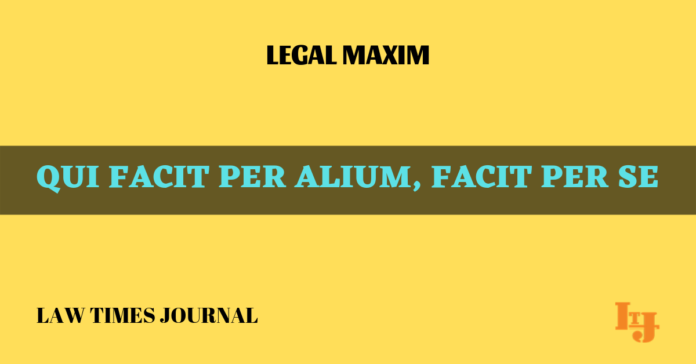
Literal Meaning
He who acts through another does the act himself.
Explanation & Origin
Qui facit per alium facit per se is a Latin legal term that means, “He who acts through another does the act himself.” It is a fundamental legal maxim of the law of agency. It is a maxim often stated in discussing the liability of employer for the act of employee in terms of vicarious liability.
Explanation – According to this maxim, if in the nature of things, the master is obliged to perform the duties by employing servants, he is responsible for their act in the same way that he is responsible for his own acts. The maxim is a shortened form of the fuller 18th-century formulation: qui facit per alium, est perinde ac si facit per se ipsum: “whoever acts through another acts as if he were doing it himself. “Indirectly, the principle is in action or present in the duty that has been represented by the agent so the duty performed will be seen as the performance of the agent himself. Whatever a principal can do for himself, can be done through an agent. The exception to this maxim would be acts of personal nature.
Illustration
It is often seen in the torts in the case of vicarious liability. For example if a master gives the some work to the servant then he is doing it through the servant but in a sense he is also doing the work.
Case Reference
In the case of H.E. Nasser Abdulla Hussain vs Dy. City[1] it was observed that It is a well-known tenet of law canonized in the dictum : “Qui facit per alium facit per se” (He who does a thing through another, does it himself). In Halsbury’s Laws of England, 3rd Edn., Vol. 33, para 407, in the context of ‘manufacturer’ it is mentioned that one who makes himself, and the one who gets a thing made by others, both are manufacturers. The latter is a manufacturer because a person is deemed to make goods or apply a process if the goods are made, or the process is applied, by another person to his order under any form of contract other than a purchase. The term “manufacturer” applies both to him who actually makes and to him who causes to be made.
In the case of Ballavdas Agarwala vs Shri J. C. Chakravarty[2] Three points were argued before the court. The first was that by the terms of the agreement and licence,the appellant was not authorised to sell butter, and thus he was not responsible for the sale in question. It was contended that the sale might have been made by Missir on his own account. This contention is without substance. That there was a sale of the seized article at the restaurant of the appellant goes without saying. Sections 406 and 407 of the Calcutta Municipal Act make the sale of adulterated or misbranded article an offence, and every person who sells such article directly or indirectly, himself or by any other person is liable. Even though such sale might be outside the permit of the vendor’s licence, the seized article was, in fact, sold. The words of the sections vicariously fasten the responsibility on -masters for the acts of the servants, and the maxim, qui facit per alium facit per seapplies. The finding is that the sale was for and on behalf of the proprietor.
In the case of K.T.M.S. Mohd. And Anr vs Union Of India[3],The Indian Income-tax Act is a self-contained Code exhaustive of the matters dealt with therein, and its provisions shown an intention to depart from the common rule, qui facit per alium facit per se.” it has been observed thus: “It has to be remembered that the purpose of the Act is to levy Income-tax, assess and collect the same. The preamble of the Act does not say so in terms it being an Act to consolidate and amend the law relating to income-tax and super tax but that is the purpose of the Act as disclosed in the preamble of the First Indian Income tax Act of 1886 (Act II of 1886). It follows, therefore, that all the provisions contained in the Act have been designed with the object of achieving that purpose.” Coming to the FERA, it is a special law which prescribes a special procedure for investigation of breaches of foreign exchange regulations.
Edited by Vigneshwar Ramasubramania
Approved & Published – Sakshi Raje
Reference
[1] (2002) 77 TTJ Mumbai 878
[2] 1960 AIR 576
[3] 1992 AIR 1831





